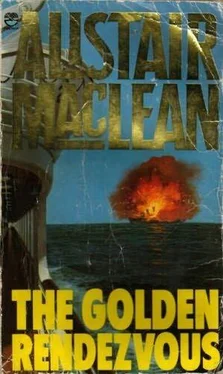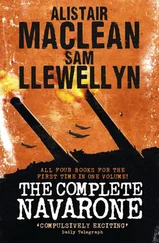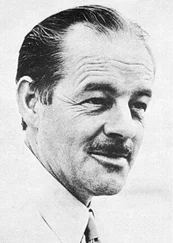She looked at me in slow speculation. She really had the most extraordinary eyes; three weeks she’d been with us and I’d never really noticed them before, eyes of that deep yet translucent green of sea water over sand in the windward isles, eyes that melted and shimmered in the same way as when a cat’s-paw of wind riffled the surface of the water, eyes that I dragged my own eyes away. See Carter, old Beresford had said. There’s the man for you. No imaginative fancies about him. That’s what he thought. I became aware that she was saying quietly, “I’ll do it. I promise. I don’t know what track you’re on, but I know it’s the right track.”
“What do you mean?” I said slowly.
“That nurse of Mr. Cerdan’s. The tall one with the knitting. She can no more knit than fly over the moon. She just sits there, clicking needles, botching every other stitch and getting practically nowhere. I know. Being a millionaire’s daughter doesn’t mean that you can’t be as slick with a pair of knitting needles as the next girl.”
“What!” I caught her by the shoulders and stared down at her. “You saw this? You’re sure of it?”
“Sure I’m sure.” “Well, now.” I was still looking at her, but this time I wasn’t seeing the eyes; I was seeing a great number of other things and I didn’t like any of them. I said, “This is very interesting. I’ll see you later. Be a good girl and get that fixed with your father, will you?” I gave her shoulder an absentminded pat, turned away, and stared out of the window.
After a few seconds I became aware that she hadn’t yet gone. She’d the door opened, one hand on the handle, and was looking at me with a peculiar expression on her face.
“You wouldn’t like to give me a toffee apple to suck?”
If you can imagine a voice both sweet and bitter at the same moment, then that is how hers was. “Or a ribbon for my pigtails?” With that she banged the door and was gone. The door didn’t splinter in any way, but that was only because it was made of steel.
I gazed at the closed door for a moment, then gave up. Any other time I might have devoted some minutes to figuring out the weird and wonderful working of the female brain. But this wasn’t just any other time. Whatever it was, this just wasn’t any other time. I pulled on shoes, shirt, and jacket, pulled out the colt from under the mattress, stuck it in my waist belt, and went off in search of the captain.
[Wednesday 7:45 p.m. — 1:15 p.m.]
As far as attendance went, Mr. Julius Beresford had no grounds for complaint that night: every single passenger on the ship had turned up for his wife’s cocktail party and, as far as I could see, every off-duty officer on the Campari was there as well. And the party was certainly going splendidly; already, at seven forty-five, practically everyone was already on his or her second drink, and the drinks served up in the drawing room of the Campari were never small ones. Beresford and his wife had been moving round, speaking to each of the guests in rotation, and now it was my turn. I saw them approaching, raised my glass, and said, “Many happy returns, Mrs. Beresford.”
“Thank you, young man. Enjoying yourself?”
“Of course. So is everybody. And you should be, most of all.”
“Yes.” she sounded just the slightest bit doubtful. “I don’t know if Julius was rightly mean, it’s less than twenty-four hours…”
“If you’re thinking about Benson and Brownell, ma’am, you’re worrying unnecessarily. You couldn’t have done a better thing than arrange this. I’m sure every passenger on the ship is grateful to you for helping to get things back to normal so quickly. I know all the officers are, anyway.”
“Just as I told you, my dear.” Beresford patted his wife’s hand, then looked at me, amusement touching the corners of his eyes. “My wife, like my daughter, seems to have the greatest faith in your judgement, Mr. Carter.”
“Yes, sir. I wonder if you could persuade your daughter not to go visiting in the officers’ quarters?”
“No,” Beresford said regretfully, “It’s impossible. Self-willed young lady.” He grinned. “I’ll bet she didn’t even knock.”
“She didn’t.” I looked across the room to where Miss Beresford was giving Tony Carreras the full benefit of her eyes over the rim of a Martini glass. They certainly made a striking couple. “She had, with respect, some bee in her bonnet about something being wrong aboard the Campari. I think the unfortunate happenings last night must have upset her.”
“Naturally. And you managed to remove this?”
“I think so, sir.”
There was a slight pause, then Mrs. Beresford said impatiently, “Julius, we’re just beating about the bush.” “Oh, now, Mary, I don’t think…”
“Rubbish,” she said briskly. “Young man, do you know one of the principal reasons I came along on this trip? Apart” — she smiled — "from the food? Because my husband asked me to, because he wanted a second opinion from you. Julius, as you know, has made several trips on your ship. He has, as the saying goes, had an eye on you for a job in his organisation. My husband, I may say, has made his fortune not so much by working himself as by picking the right men to work for him. He’s never made a mistake yet. I don’t think he’s making a mistake now. And you have another very special recommendation.”
“Yes, ma’am,” I said politely.
“You’re the only young man of our acquaintance who doesn’t turn himself into a carpet to be trampled on as soon as our daughter appears in sight. A very important qualification, believe me.”
“Would you like to work for me, Mr. Carter?” Beresford asked bluntly.
“I think I would, sir.”
“Well!” Mrs. Beresford looked at her husband. “That’s settled…”
“Will you?” Julius Beresford interrupted.
“No, sir.”
“Why not?”
“Because your interests are in steel and oil. I know only the sea and ships. They don’t mix. I have no qualifications to work for you, and at my present age I’d be too long in acquiring them. And I couldn’t accept a job for which I’d no qualifications.”
“Even at double the money? Or three times?”
“I’m grateful for the offer, sir, believe me. I do appreciate it. But there’s more to it than money.”
“Ah, well.” The Beresfords looked at each other. They didn’t seem too disturbed over my refusal; there was no reason why they should. “We asked a question, we got an answer. Fair enough.” He changed the subject. “What do you think of my feat in getting the old man here tonight?”
“I think it was very thoughtful of you.” I glanced across the room to a spot near the door where old Cerdan, sherry glass in hand, was sitting in his wheel chair, with his nurses on a settee by his side.
They too had sherry glasses. The old boy seemed to be talking animatedly to the captain. “He must lead a very shut-in life. Much difficulty in persuading him?” “None at all. He was delighted to come.” I filed away this piece of information; my one encounter with Cerdan had left me with the impression that the only thing that would delight him about such an invitation would be the opportunity to give a surly refusal. “If you’ll excuse us, Mr. Carter. Hosts’ duties to their guests, you know.”
“Certainly, sir.” I stood to one side, but Mrs. Beresford planted herself in front of me and smiled quizzically.
“Mr. Carter,” she said firmly, “You’re a very stiff-necked young man. And please don’t for a moment imagine that I’m referring to your accident of last night.”
They moved off. I watched them go, thinking all sorts of thoughts, then crossed to the hinged flap that led to the rear of the bar. Whenever I approached that flap I felt it was not a glass I should have in my hand but a machete to help me hack my way through the jungle of flowers, potted shrubs, cacti, and festoons of creepers and hanging plants that transformed the place into the most unlikely looking bar you’d ever seen. The interior desiguer responsible had gone into rhapsodies about it, but it was all right for him he didn’t have to live with it; all he had to do was to retire nightly to his semi-detached in south London where his wife would have had him out the door if he’d tried on any such nonsense at home. But the passengers seemed to like it.
Читать дальше
Конец ознакомительного отрывка
Купить книгу












